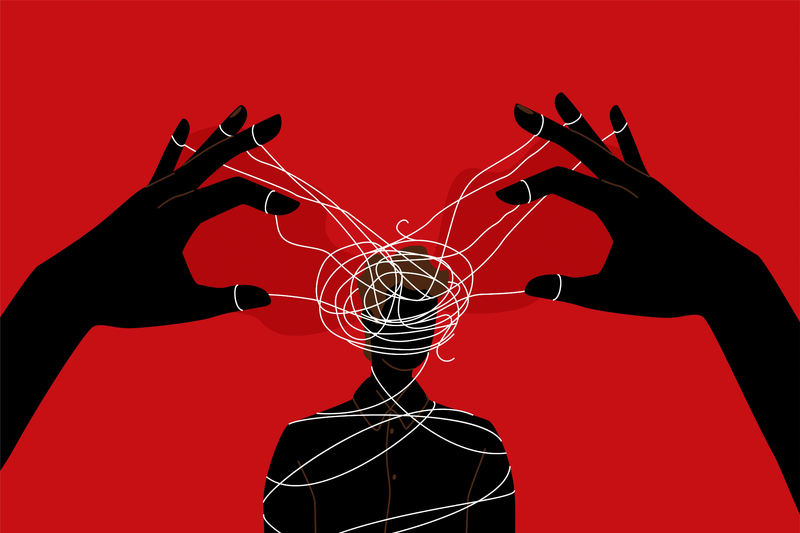17 Ways a Narcissist Slowly Trains You to Doubt Yourself
It never starts with screaming or obvious cruelty. It starts with charm. With “just kidding.” With that subtle shift where you stop trusting your own gut—and start second-guessing everything. Narcissists don’t break you in one blow.
They unravel you slowly, thread by thread, until you’re left wondering, “Am I the problem?” Here are 17 deeply manipulative tactics narcissists use to chip away at your confidence, clarity, and self-trust—so you can name what’s happening and begin to take your power back.
1. They “forget” things they said—then act like you imagined it.

Ever try to call out a lie and suddenly feel like you’re in the Twilight Zone? I remember sitting across from him, coffee mug in hand, convinced we just had that conversation yesterday. But when I brought it up, he looked at me with that blank, almost amused stare and said, “I never said that.”
It’s classic gaslighting. Little by little, you start to question your version of reality. You replay everything in your head, searching for proof, only to end up doubting yourself more.
Your confidence drains away. The story becomes less about what actually happened and more about whether you can trust your own memory at all. That’s how it starts—innocent, right? Until you find yourself apologizing for things you know aren’t your fault. It’s exhausting, and it’s how the cycle tightens its grip.
2. They constantly criticize you—but call it “helpful advice.”

Everyone deals with a little feedback, sure. But with a narcissist, it’s a constant barrage dressed up as “just trying to help.”
He’ll critique your clothes, your laugh, how you load the dishwasher, then add, “I’m only saying this for your own good.” At first you might try to brush it off, but eventually every criticism lands right in your chest like a sack of bricks.
You start to internalize the message: maybe you really do need to fix everything about yourself. The worst part? You begin to crave his approval just to feel okay again. The line between advice and control fades away, leaving you with nothing but self-doubt. Sometimes it’s not the words themselves, but the slow, relentless drip that does the most damage.
3. They make their bad behavior your fault.

Isn’t it wild how someone else’s mistakes can somehow become your problem? If he lies, it’s because you “drove him to it.” If he yells, you must have “pushed his buttons.”
You start to feel like you’re walking on eggshells, forever tweaking your behavior to avoid his next explosion. Before long, every argument turns into a courtroom drama—with you in the defendant’s seat.
You apologize for things that aren’t even yours to own. Deep down, you know it’s unfair, yet their twisted logic worms its way into your thoughts. After a while, you might even start believing you really are the reason for all the chaos. That’s the trick: flipping the blame until you forget what’s real and what’s just manipulation.
4. They twist your words—then blame you for being “dramatic.”

Ever tried to express a boundary and ended up being the ‘crazy one’? You say, “Hey, that hurt my feelings,” and suddenly he’s rolling his eyes, calling you dramatic, twisting your words into something you never said.
You leave the conversation feeling like you might actually be overreacting. That self-doubt creeps in, making you second-guess if your feelings are even valid.
It’s not just frustrating—it’s a mind game. You start shrinking your emotions just to avoid the backlash. That’s the real drama: how you slowly learn to bottle up your truth so you won’t be accused of being too much. Meanwhile, he plays the calm, rational one, all while spinning the story in his favor.
5. They build you up—just to tear you down.

One minute you’re the most amazing person in the world—he can’t stop singing your praises. You feel invincible, like you finally matter. Then out of nowhere, he shuts down, turns cold, and picks you apart for the tiniest thing.
The emotional whiplash is brutal. You start chasing those rare moments of approval like they’re gold, convinced you just need to try harder to get them back.
It’s a sneaky trick: handing you confidence with one hand, then yanking it away with the other. The highs feel so good you forget how low the lows really are. That push-pull keeps you hooked, but leaves you feeling empty, always reaching for validation that never lasts.
6. They compare you to others—especially to make you feel “less than.”

Ever had someone say, “Why can’t you be more like her?” Ouch. That sting lingers far longer than you’d guess.
The comparisons never stop, whether it’s to an ex, a coworker, or even a random stranger on Instagram. Suddenly, you’re measuring yourself against impossible standards, always coming up short.
It wears you down. You start doubting your value, your looks, your every move. The truth? He wants you to feel small, so you’ll try harder for his crumbs of approval. It’s not about love—it’s about control, and those comparisons are just another tool for keeping you unsure of your own worth.
7. They isolate you from people who reflect the truth.

Slowly, almost invisibly, your world gets smaller. He makes subtle digs about your friends or hints that your family doesn’t really care about you.
You might hear, “They just don’t get us,” or, “I don’t like how they influence you.” Over time, you see less and less of the people who tell you the truth—because he wants to be the only voice you listen to.
Pretty soon, you’re alone with your doubts. Without outside reality checks, it’s easy to lose perspective and start believing his version of events. That isolation isn’t coincidence—it’s a calculated move to make you question yourself and keep you close.
8. They invalidate your feelings—constantly.

If you’re sad, you’re “too sensitive.” If you’re angry, you’re “overreacting.” There’s always a reason your emotions are “wrong” in his eyes.
You learn not to trust how you feel. You start editing yourself, thinking, Maybe I really am being dramatic. After all, he says it so calmly, with that patronizing smile.
Before long, you bottle up every emotion just to keep the peace. It’s not just invalidating—it’s erasing. The more you hide what you feel, the further you drift from yourself. That’s exactly what he wants: for you to lose touch with your own truth so he can define it for you.
9. They withhold affection as punishment.

Ever notice how affection disappears the minute you speak up? You finally say what’s on your mind, and suddenly, he’s giving you the cold shoulder for hours—maybe days.
It’s not accidental; it’s strategic. Love becomes something you have to earn back, and any disagreement means starting over from scratch.
Eventually, you start walking on eggshells, worrying that any wrong move will cost you the connection you crave. That’s the real punishment—not just silence, but the way it teaches you to quiet your own needs. It’s emotional blackmail, wrapped up in the fear of being left out in the cold.
10. They create confusion… and call it “miscommunication.”

You know those conversations where nothing adds up, but you still end up apologizing? That’s no accident.
He’ll contradict himself in the same breath, deny what he clearly just said, and insist you simply “misunderstood.” Over time, you start to question your ability to follow even the simplest things.
The fog thickens until you’re constantly second-guessing your own clarity. And the more confused you feel, the more power he has. It’s not just about being right—it’s about making you so lost that you depend on him to ‘explain’ your own life to you. That’s how confusion becomes control.
11. They use your insecurities against you.

Remember that one thing you shared, thinking you were safe? Maybe you opened up about a fear, a past mistake, or something you’re not proud of—then, out of nowhere, he weaponizes it in an argument.
He’ll sneak in snide remarks, throw your secrets back at you, and suddenly, what was once a moment of trust is now just ammo. It’s like being sucker-punched with your own vulnerability.
Soon, you learn to keep everything bottled up. The cost of being real becomes too high, and your world gets a little bit smaller every time. That’s how insecurity becomes a leash—one he can pull any time you try to get free.
12. They turn others against you subtly.

Ever walk into a room and feel like everyone’s in on some secret about you? Chances are, he’s been planting seeds behind your back—just enough to make people wonder.
He might say he’s “worried about you” or drop little hints that make others question your stability. Over time, friends start acting distant, and you have no clue why.
It’s sneaky sabotage. The isolation doesn’t just come from him—it comes from everyone else pulling away. Suddenly, you’re defending yourself on all sides. The worst part? You never see it coming until you look around and realize you’re standing alone.
13. They flip the narrative to play the victim.

Somehow, you’re always the villain—even when you know you’re not. He’ll cry, sulk, or fly off the handle until you’re the one doing the apologizing.
Suddenly, you’re comforting him after he’s hurt you. The conversation always shifts from what he did to how you made him feel.
You start to question if maybe you were too harsh, or if you could have handled things better. That’s how the script flips. You end up feeling guilty for things that aren’t yours to carry, all so he can keep dodging responsibility and stay center stage.
14. They interrupt, talk over, or mock your opinions.

Ever feel like you’re talking just to hear yourself? Every time you try to share an idea, he interrupts, talks over, or flat-out mocks what you’re saying.
After a few rounds of this, you start shrinking back, holding your tongue to avoid the hassle. Your opinions feel smaller and smaller, until you forget you even have a voice.
It’s not just rude—it’s erasing. The silence grows, not because you have nothing to say, but because you’re tired of fighting to be heard. That’s how you learn to disappear right in plain sight.
15. They move the goalposts.

Ever felt like every time you finally meet his standards, suddenly there’s a whole new set of rules? Yesterday’s “perfect” is today’s “not enough.”
You start to feel like you’re chasing something you’ll never catch. The more you try to please, the more the rules change. Exhausting doesn’t even begin to cover it.
That’s the trap—he keeps you so busy trying to be “good enough” that you never realize how unfair the game is. After a while, you question if you were ever enough to begin with, and that’s exactly what he wants.
16. They make you feel like you’re always being watched or judged.

It’s that feeling you get when you can’t even pick out a loaf of bread without hearing his voice in your head: “Don’t mess up.”
He doesn’t have to be in the room for the judgment to stick. You start censoring yourself, double-checking every move, afraid of what he’ll think or say later.
It’s exhausting—like being on a reality show with no off switch. The worst part is, the more you try to be perfect, the more you forget what you actually want. His voice becomes the only one that matters, even when he’s nowhere to be found.
17. They make you question your worth—until you rely on them for it.

Slowly, your sense of self gets chipped away until you hardly recognize the woman in the mirror. Every compliment comes with a jab; every criticism cuts a little deeper.
You stop trusting your opinions, your choices, even your basic gut feelings. The only reassurance left? Whatever he decides to give—if he gives it at all.
It’s a brutal cycle. You end up depending on the one person who’s made you feel this small in the first place. That’s how narcissists win: not by being loud, but by making their voice the only one you trust.







